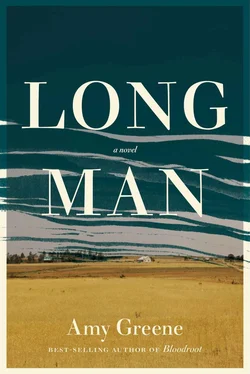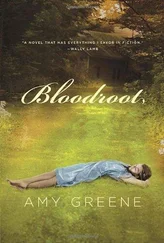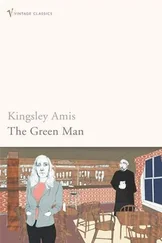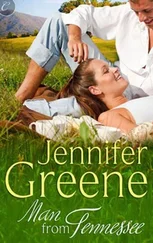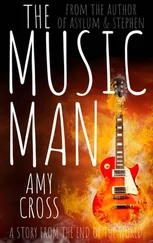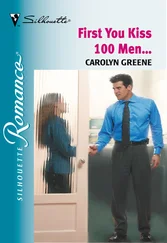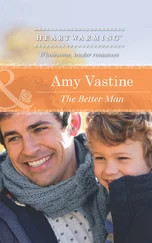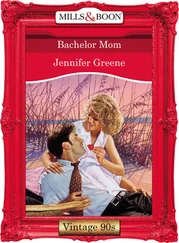When they reached the second tree it shook like something alive, pelted leaves whirling, apples thudding. Ellard lowered himself to one knee and inspected the ground where Annie Clyde pointed. What might have been a footprint was now a misshapen trough. “It was there,” Annie Clyde said, begging with her eyes for him to believe her. He got to his feet and she took his arm again, jogging the lantern. “We ought to be out finding Amos,” she said. He looked at James standing hatless beside his wife, as if he didn’t feel the rain down the planes of his face. Their eyes met long enough for Ellard to see that what little hope James had had in the first place was waning. When Ellard plunged back into the weeds they followed like lost children themselves.
For another half hour they canvassed the farm. Ellard walked through the cornrows but Amos had left no trace behind. In the barn, the smokehouse, the corncrib, Ellard cast his light into corners looking for tracks in the dirt, blood drips on the plank walls, strands of hair or cloth snagged on nails. After the three of them had inspected the outbuildings they went back through the slapping hayfield weeds to where the trees started, the storm and the deep shade making the woods pitch black. Even with their lanterns it was near impossible to see under the dense canopy of leaves, fog seeping between the close trunks. Ellard could hardly hear himself shouting for Gracie over the storm. They climbed a ways up the mountain, calling to the child and whistling for the dog. But if she was calling back they couldn’t hear it. Or if Amos was in the trees laughing at them. All Ellard could do was keep his eyes open for signs of movement. Finally he led them out of the woods to convene in the hayfield. “I’ve done radioed Whitehall County,” he said. “They’ll be along anytime. We can talk back at the house until they get here.”
“We need our own people to look,” Annie Clyde rasped. “But everybody’s gone now.”
“There’s still some around,” Ellard said.
Annie Clyde leaned against James. “Where are your men? They’re taking too long.”
“Me and James’ll go on if they don’t make it before much longer,” Ellard said. “Best thing for you to do is stay and light the lamps so she can see to get home if she’s out here lost.”
“No. I’m going with you.”
James looked down. “Gracie can’t come back to an empty house.”
Ellard nodded. “I’d say she’ll be wanting her mama.”
It got quiet besides the rain tapping on the slickers of the men. Annie Clyde looked from James to Ellard, as if trying to believe it was possible that Gracie might come home on her own. Then she wilted, her shoulders caving. When her knees weakened James put his arm around her waist and helped her back across the field behind Ellard. They went in the kitchen door. James led Annie Clyde to the pine table where she sat staring at the stove as he made a fire in it. Ellard took a seat across from her while James lit the lamps. He removed his hat and set it aside on the table, hung his slicker from the back of the chair. He wondered if Annie Clyde or James wanted to change their clothes but they only waited for him to go on. He brought a notebook from his breast pocket and asked them to talk him through the details of the day. James began with coming home from Sevierville. Annie Clyde began with Gracie chasing the dog into the corn. Their voices flat, their eyes glazed. When they had both fallen silent he replaced the notebook in his pocket. “All right then,” he said. “You all sit and rest yourselves while I take a look around.”
Ellard stood and shrugged back into his slicker. Annie Clyde asked, as if out of nowhere, “Will you get my aunt Silver? I didn’t make it that far up the mountain. She don’t know yet.”
At the mention of Silver Ledford’s name Ellard felt his mouth corner twitching. He didn’t know if he could take her on top of everything else. She was a nerve-racking woman, and as far as Ellard knew not much of a doting aunt either. But he supposed Annie Clyde needed her mother right now and Silver was the closest thing she had. “I’ll send somebody up yonder to get your aunt before me and James leave,” he said. “You ought not to be here by yourself.”
Annie Clyde dropped her head, her hands lying limp in her lap. Ellard put on his hat and left her at the table with James to investigate the rest of the house, his shadow moving on the wallpaper. There was nothing out of place, no print they hadn’t tracked in themselves.
He thought as he climbed the stairs about what came next, once the Whitehall County constable made it to the farm. Beulah Kesterson would have to be questioned, but Ellard didn’t know how far he would get with her, in spite of the soft spot she had for him. Beulah had been something like a grandmother to Ellard growing up in the hollow. He’d spent many afternoons shooting marbles under the shade trees around her cabin. In the summers after Amos hopped a train he’d helped Beulah tend her goats and her bees. But he didn’t doubt where her loyalties lay. It might be better to send the constable up to see her, considering she knew Ellard and Amos to be enemies. She might be more willing to give Amos up to somebody else. Ellard needed to put most of his efforts tonight into rounding up a search party. Standing alone in the Dodsons’ bedroom, his lantern casting a shine on Gracie’s empty crib in the corner, he feared it would be a difficult task. He was relieved when he heard at last the sound of slamming vehicle doors and the faint but clear voices of men in the yard below. Ellard hoped for a competent tracker in the bunch, or that someone had brought along a dog. Though as far as Ellard knew there was one man in these parts that raised bloodhounds and he was in Clinchfield, an hour out of reach.
When Ellard went back downstairs James was waiting for him at the front door. “Let’s go,” he said. Ellard didn’t have to ask where he meant. But before they left Annie Clyde spoke up from behind them, her voice a husk. “James.” They turned around and she was standing there in her still-soaked dress. In one hand she held James’s hat, in the other a Winchester rifle. James took the hat and put it on his head. He hesitated before reaching for the gun. Annie Clyde thrust it into his hands. “If he’s got her, I want you to kill him.” Ellard studied Annie Clyde’s haggard face. Without a word James took the rifle and went out the door. Ellard followed, boots thumping across the porch planks and down the steps toward whatever waited.
When the sun was barely up and Amos felt confident any workman or watchman left in the bunkhouse was asleep or just rising, he went out on the dam spanning the gorge where the river valley narrowed. There was a road running across the top of the mammoth structure, a two-lane highway with double yellow lines. Looking west he could see the road crooking out of sight around the humped mountainsides, blasted by the power company. When it was open it would connect this part of the valley to US 25 and Knoxville. Along the deserted highway there ran a pedestrian sidewalk. Amos trailed his fingers down its metal railing, overlaid in places with a sticky netting of cobwebs. He paused when he came to the middle of the dam where a concrete tower loomed over his head with two flags hanging limp from a pole, one American and the other blue with a white TVA emblem. Inside the tower an elevator shaft led down to the powerhouse, its locked steel door scratched and grimed with dirt. From two hundred feet high Amos could see, far in the distance, the rain-pocked water curving away between the forested hills. Leaning over with both hands on the railing he could look straight down the slant of the algae-stained spillway and see the dam doing its work, white water sluicing into the river below. He could see the tile roof of the powerhouse and its reflection rippling on the outflow, the framework of the transformer pad like a cage of prison bars on the bank. He supposed the design of the dam and the buildings was meant to be modern but they reminded him of a penitentiary.
Читать дальше
